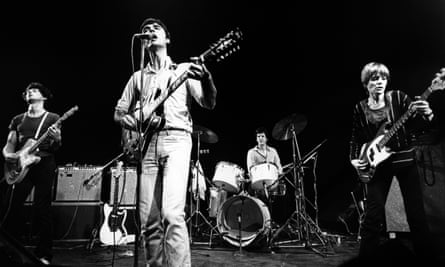Talking Heads’s song Once in a Lifetime is cool and edgy, but you still hear it in supermarket aisles. It’s at once rock and art and has been covered by both Kermit the Frog and Australian cricketer David Boon. Much like Robert Palmer’s Johnny and Mary, Once in a Lifetime is one of those rare cool tracks that charted – a song that can be played on both Triple M and community radio.
It’s the first single from the band’s 1980 album Remain in Light – a desert island disk of mine – and contains phrases often repeated at barbecues, which is surely the perfect location for David Byrne’s existential lyrics about consumer culture.
And you may find yourself in a beautiful house, with a beautiful wife,
And you may ask yourself, ‘Well, how did I get here?’
These words are often accompanied by the cook making cutting actions up their arm with the tongs while throwing their head back in a physical shock treatment motion made memorable in the Toni Basil-directed film clip.
It’s a very danceable song, as is much of side one of Remain in Light, drawing as it does upon the influence of Fela Kuti’s Afrobeat. It is also a dead simple song. So simple that the producer, Brian Eno, was at first reluctant to put the early demo in the mix because he thought it had no verse or chorus differentiation. But there are two brilliant musical motifs in Once in a Lifetime that make it stand out.
First, the two-note killer Tina Weymouth bassline is such a hook, you could hang an army coat on it: a repetitive two-bar groove that reverses itself between verse and chorus. Heard at parties, it inspires outbreaks of air-bass mime histrionics.
Second, the memorable watery synth arpeggio motif devised by keyboardist and guitarist Jerry Harrison that thematically connects up with the large, eminently singable gospel chorus:
Letting the days go by, let the water hold me down,
Letting the days go by, water flowing underground,
Into the blue again, after the money’s gone,
Once in a lifetime, water flowing underground.
I became aware of Talking Heads in my late teens. The albums Talking Heads: 77 and More Songs About Buildings and Food were filled with angular, lo-fi, post-punk songs, but then for their third album, Fear of Music, they brought in Eno as a producer and the sound got moodier and more percussive.

I was 19 and an aspiring musician when Remain in Light was released – in awe of this band that used the studio as an instrument, were cutting edge and had a strangeness and smartness to their lyrics. I was doing an arts degree at Melbourne uni, smoking weed, attending parties in Fitzroy North and heading out to the Blackfish Creek camping grounds on weekends with my friends to build huge bonfires, drink cheap red wine and play loud music from the 4AD label. About the same time I teamed up with guitarist John Phillips and was writing the earliest forms of the songs that we’d go on to release in our band Not Drowning, Waving.
On songs such as Palau, Crazy Birds, Blackwater and Sing Sing, the Remain in Light template loitered in the back of our minds – the rhythm underlays with atmospherics on top were part of our shtick. I, however, was no David Byrne, though we share initials, and in my older years I wear black-rimmed glasses.
Once in a Lifetime is a song I return to and discover new things with every listen. I love it as much now as when I was 19. As a teen it made me feel wise, and nowadays it makes me feel young. There’s a lot to be said for a song that can achieve that.
Time isn’t holding up, time isn’t after us
Same as it ever was, same as it ever was.
David Bridie’s collaborative spoken word album, It’s Been a While Since our Last Correspondence, is out in March

Comments (…)
Sign in or create your Guardian account to join the discussion